- Notes
According to court documents, Lawrence waived his Miranda rights and told investigators, “I’m toast anyways I guess, so, yeah I did it.”
According to court documents, Lawrence waived his Miranda rights and told investigators, “I’m toast anyways I guess, so, yeah I did it.”
I love the new update to iA Writer, but this little tidbit has me super excited:
For quick access to your most important folders, add them to Favorites. That way, they’ll always be visible in the Organizer, and you can quickly dive into your active projects. Favorites are platform-specific. In the next step, we are planning to sync them across your devices. (emphasis mine)
Can’t wait.
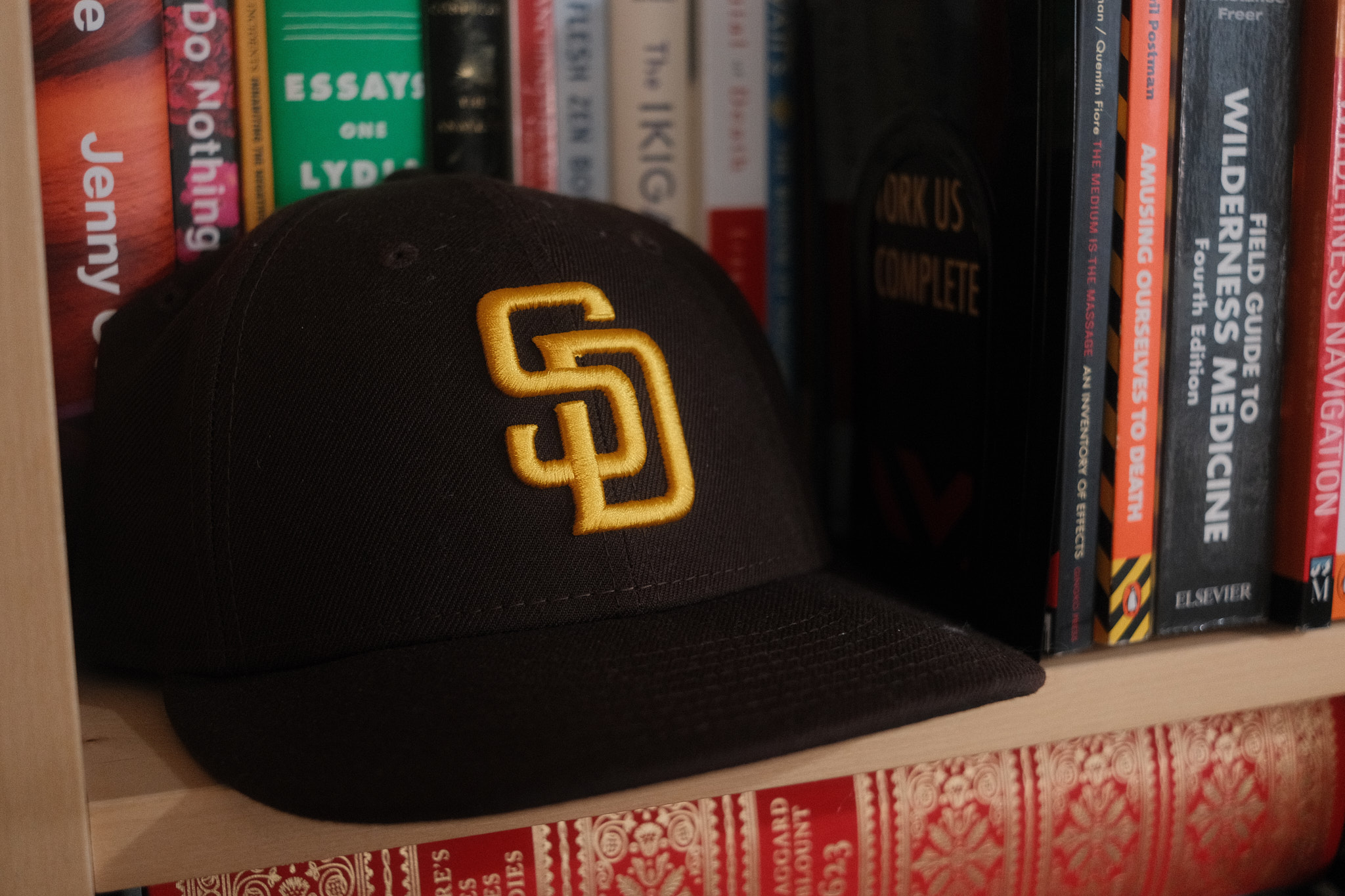
Shohei Ohtani is the best player in baseball right now, and he could end up being the best player of all time, the GOAT of GOAT’s. To be the best at something, you have to sacrifice so much, and Ohtani is no different. I was so fascinated by Ken Rosenthal’s article today in The Athletic about Ohtani and the relationships around him (paywall).
Joe Maddon, Ohtani’s manager with the Angels from 2020 to June 2022, asked:
“Was he that married to baseball?”
The answer, those in Ohtani’s orbit say, was yes. Experts say such single-mindedness is not uncommon among Japanese athletes. But while many players who moved from Japan to the majors showed intense focus, Ohtani’s single-mindedness as both a pitcher and hitter is a level above.
Even though the article was focused more on the relationships around Ohtani, particularly Ippei Mizuhara, his interpreter that pilfered almost $17 million from Ohtani to satisfy his gambling debts, I was most interested in Ohtani’s intense focus to simply be the best, to be great. “One former Angels employee,” the article continues,
described Ohtani’s work-life balance as “99 to 1” in favor of work. He was so regimented in his daily preparation as a pitcher and hitter, the employee said, “it was not in his mind space to enjoy the moment.” Ohtani would take an iPad home to watch the next day’s starting pitcher. He even monitored his sleep — Sports Illustrated reported Ohtani strives for 10 hours a night, plus a two-hour nap before a game — through a wearable device.
Ten hours of sleep plus a two hour nap before the game. Half his day is spent sleeping, the other half is spent working on and becoming the absolute best baseball player he can be.
I’ve latched onto this article today because I am tired of consistently being disappointed with myself whenever I don’t live up to whatever lofty standards I want to meet, and I know I won’t ever be great at something like Ohtani is great at baseball, nor do I actually want to be great like him at any one thing, but I am tired of any and all excuses I come up with for not doing something I want to do. I want to do a lot of things, and I would love to be great at them, but at the very least, I want to respect myself and the things I want to do, and I don’t think I am. I feel like I’m consistently disrespecting myself and the things I want to accomplish, and I feel like I’ve lost my focus. The coronavirus obviously did not help, but if I’m being truthful to myself, I feel like I had lost it years before that.
One way I’ve tried to motivate myself is by reminding myself of what I have done and what I have accomplished, but instead of having that energize me, it drains me. I’ve read books and tried productivity systems and I’ve tried building habits and so many other things, and yet… I’m still here, frustrated and angry and depressed and a million other things. Again, I’m not comparing myself to Ohtani because he’s such a unicorn, but what I am doing is looking at his motivation to be great to my own lack of motivation to even read a book, let alone writing one.
I’m frustrated because I used to have this insane level of motivation to push myself to become something greater than my own imagination could conjure up, and it’s just gone now. Where did it go? Fuck, it’s frustrating. Where did it go? I don’t know, and I have no idea where to even begin to find it again.
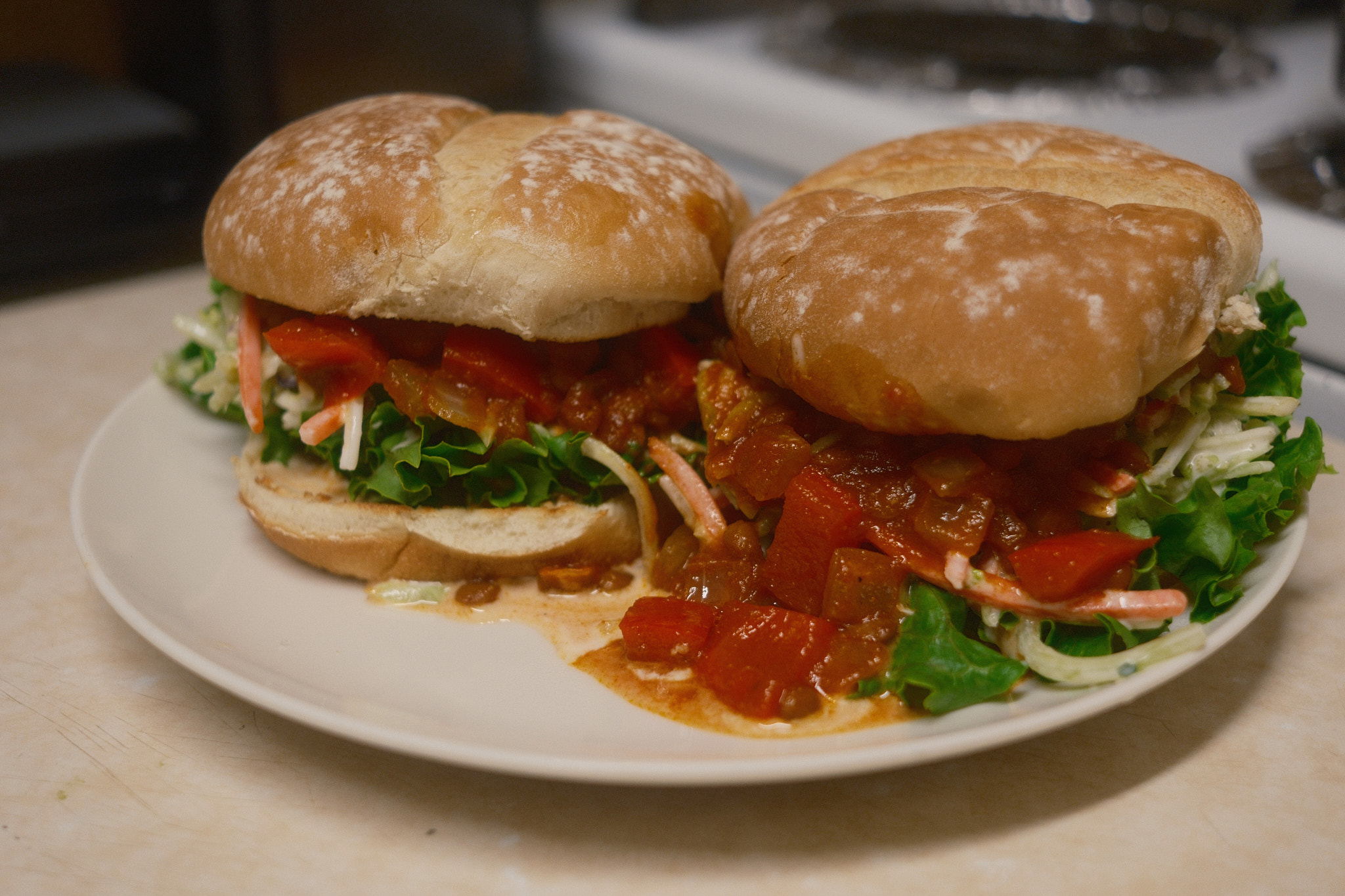
Sloppy joes for dinner tonight.
There aren’t enough wildland firefighters and the Miller Peak Fire has grown to over 1,900 acres, something I knew would happen a few days ago. That temptation to un-retire from firefighting is growing stronger and stronger… but wildland firefighting is its own kind of commitment that I don’t think I can afford to make anymore. I do miss it, though.
I subscribed to The Athletic yesterday, and I’ve been very impressed and engrossed with the new season of Hard Knocks: Offseason with the New York Giants. Seeing the behind the scenes at roster construction is interesting as hell. I stopped watching the NFL years ago (around the time the Chargers defected from San Diego to Los Angeles), but I’m considering jumping back into it this year.
Also, I’ve never coached anything in my life, but I am thinking about popping that cherry sometime during this upcoming school year. I love sports, and I love kids, so it only makes sense, right?
“We are all digital notebooks now,” Warren Ellis wrote. “Writing just for ourselves and whoever finds their way to our caves to look over our shoulders as we scribble thoughts down in public and daub pictures on the walls.”
I’ve stopped publishing notes and journal entries on my blog because I’ve mostly been writing in my notebooks now. I’ve been writing for at least an hour every day since the start of last year, a span of about 636 days. I’ve written hundreds and hundreds of pages in my notebooks, and when I couple that with the time spent trying to live my life as best as I can, I’ve simply stopped making time for this online space of mine. I feel kinda meh about it, honestly. The only reason I’m writing this entry is because I want to publish something at least once a month, keeping some trivial streak of mine alive.
Warren was writing about something he calls a “social media winter,” this idea that “social media doesn’t create ‘growth’ any more.” “If you use social [media] to keep up with your friends,” Warren wrote, “then get them to move to new channels with you and keep them close.” Facebook, Instagram, and especially Snapchat have been daily companions to me for the past year, and I have enjoyed myself tremendously on them because my friends are on there. Contrary to my past feelings on them, my time on social media this year has been nothing but positive. They’re not without their problems, but what doesn’t have problems nowadays? So again, couple this with my time spent in my notebooks and living my life, and I’ve frankly lost most of my motivation to tend to this little digital notebook of mine.
And yet…
I like having an online presence. I like having my own little digital garden with my name on it and my words and my photos and my everything on it. Even now, as I’m writing this, I’m feeling those old feelings of pleasure and contentment and even calmness that comes with writing something for myself and for the 2 people who have added this site to their RSS readers. I read Warren’s post on the day he published it, and I’ve been thinking about it ever since. This idea was planted then and has been growing throughout the week, and sure, I probably could’ve explored it some more in my notebook, but he’s talking about the web, about blogging more specifically, and I feel like my response to it should be on the web, too.
I’ve gone through spurts of intense productivity and long stretches of silence, and I’m not sure where I fall on that spectrum now. I have ideas and desires and plans for this digital notebook of mine, but I don’t know what will come of it. Life has been incredibly fun and challenging this year, and I’ve enjoyed writing about it in my notebooks and talking about it with the people I care about the most, so I’m not quite sure how to fit this place into my life right now. This could be the start of something fun and cool, or it could simply be the ravings of a madman. Not sure yet.
I guess we’ll find out, right?
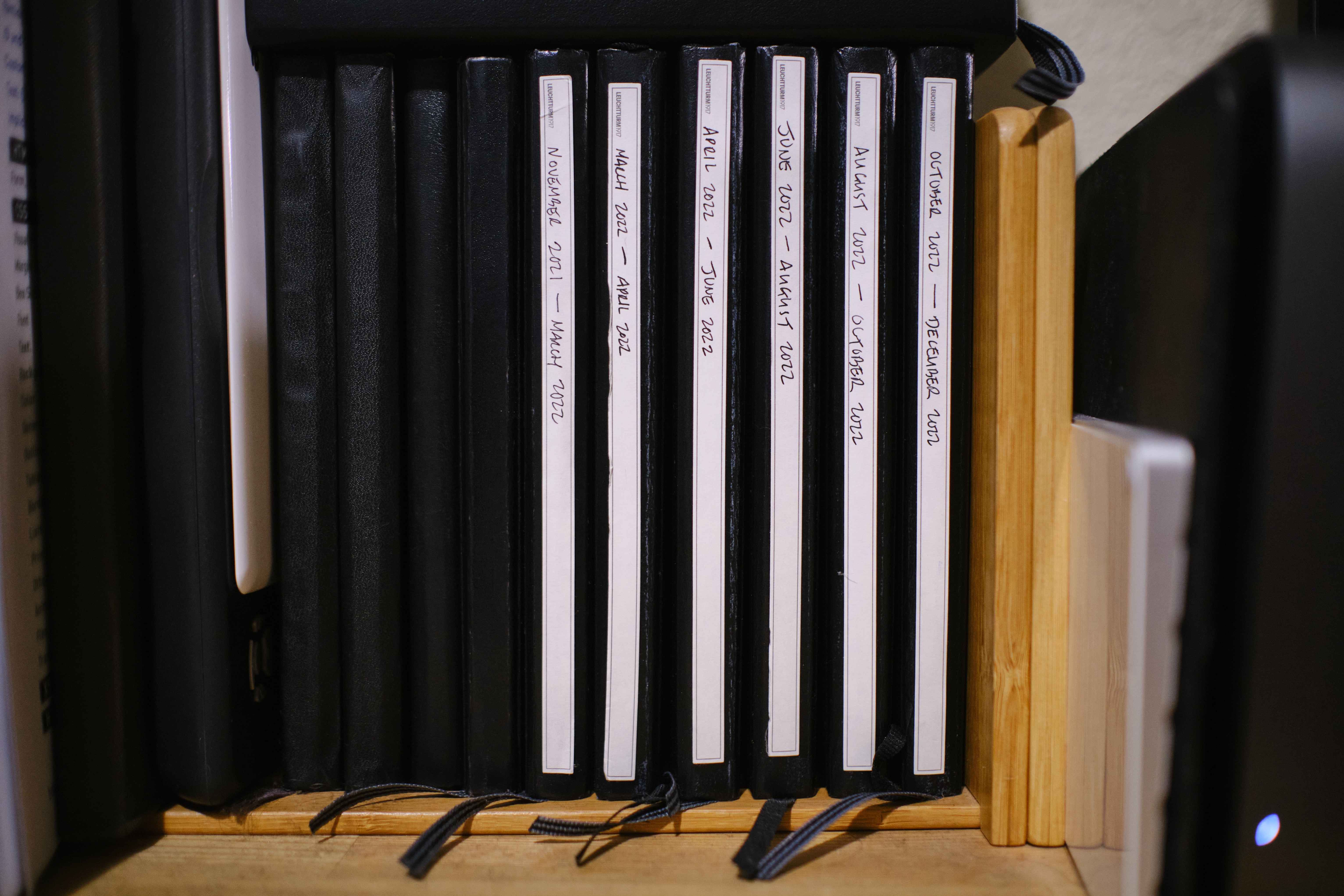
I finished six notebooks last year, and I have every intention to finish more this year. Writing in my notebooks has become one of my most valuable activities, and the thought of living without them frightens me. I’ve been journaling for a long time, but my decision to do them in these Leuchtturm1917 notebooks last year was a good one. The size, the paper quality, the numbered pages—I love all of it.
In my Year in Reading post, I mentioned that I began to use my notebooks as a commonplace book. That decision changed many things for me: it improved my reading, it clarified my thinking, and it ingrained my notebooks deeper into my life.
That last one is something I’ve been working toward since I first learned about Leonardo da Vinci in the 5th grade. Leonardo da Vinci was a magnificent son of a bitch, someone who opened my tiny little child mind to a wider world of possibility. At that age, my entire identity revolved around my skills as an artist. I could draw really well, and when I saw photos of da Vinci’s notebooks, I realized that I needed to keep notebooks, too, because I wanted to be just like him. If da Vinci sketched in a notebook, I wanted to sketch in a notebook, too.
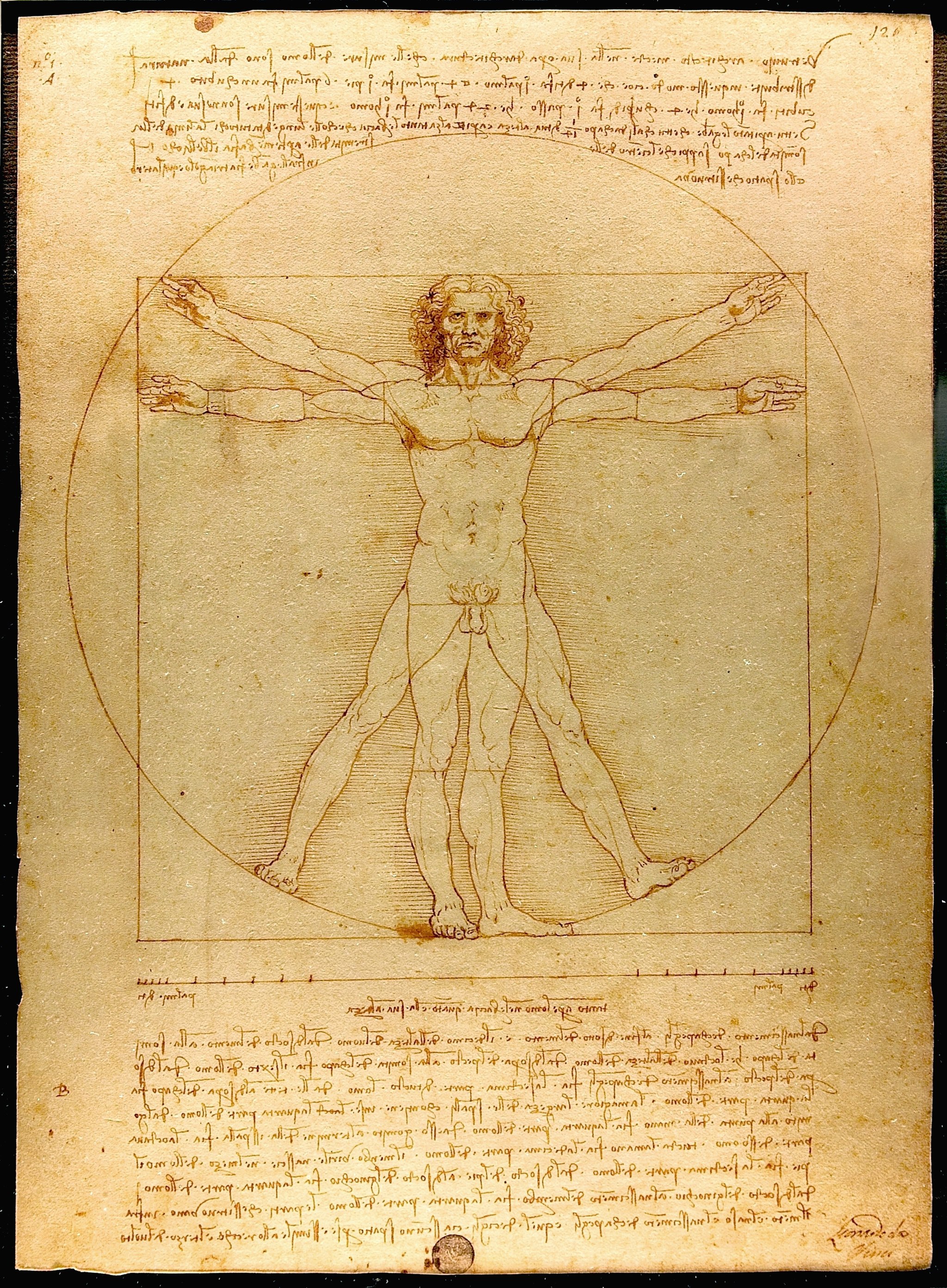

Leondardo da Vinci, Public domain, via Wikimedia Commons
As I grew older, and as the darkness of the world began to overwhelm me, I stopped drawing and I started writing. Writing helped me combat these demons, and when I became quite good at that, my entire identity changed and revolved around writing. I wrote a lot during high school, and that helped me get into a good university where I would continue to write. At this state of my life, I considered myself a writer, an affixation that has stuck with me ever since.
During college and throughout most of my twenties, I used the classic pocket notebooks from Moleskine. Each pocket notebook took me a few years to finish but finish them I did. During the second half of my twenties, I became a minimalist, and so many of my thoughts during that time were focused on simplicity. I wanted to simplify everything, and that included my notebooks. I learned about these popular memo books from Field Notes, and those felt perfect for me, so I used those to write in up until my mid-thirties. I loved my Field Notes notebooks. They were small, they fit in my back pocket, and they didn’t take very long to finish.
But they weren’t quite right. That idea of emulating da Vinci had never left me, and I feel like it’s time I do something about it. If 2022 was the year of the commonplace book, I want 2023 to be the year of the sketchbook.
Sure, but what does that mean?
I’m glad you asked! Because I have collected some images of notebooks I like. When I was playing through The Last of Us Part II back in 2020, I wrote that Ellie’s notebook pages were beautiful, a sentiment I still hold. Look at them:
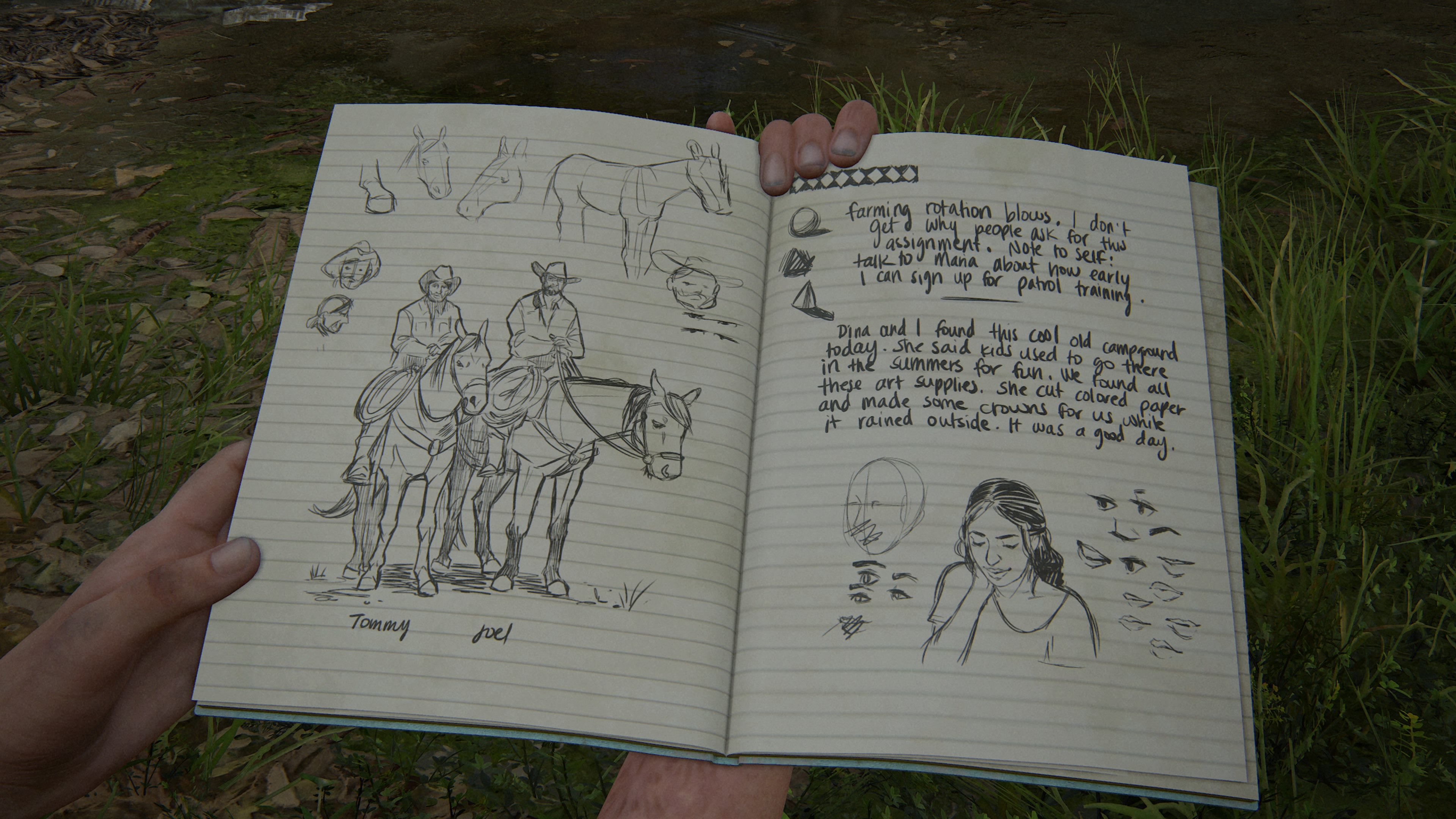
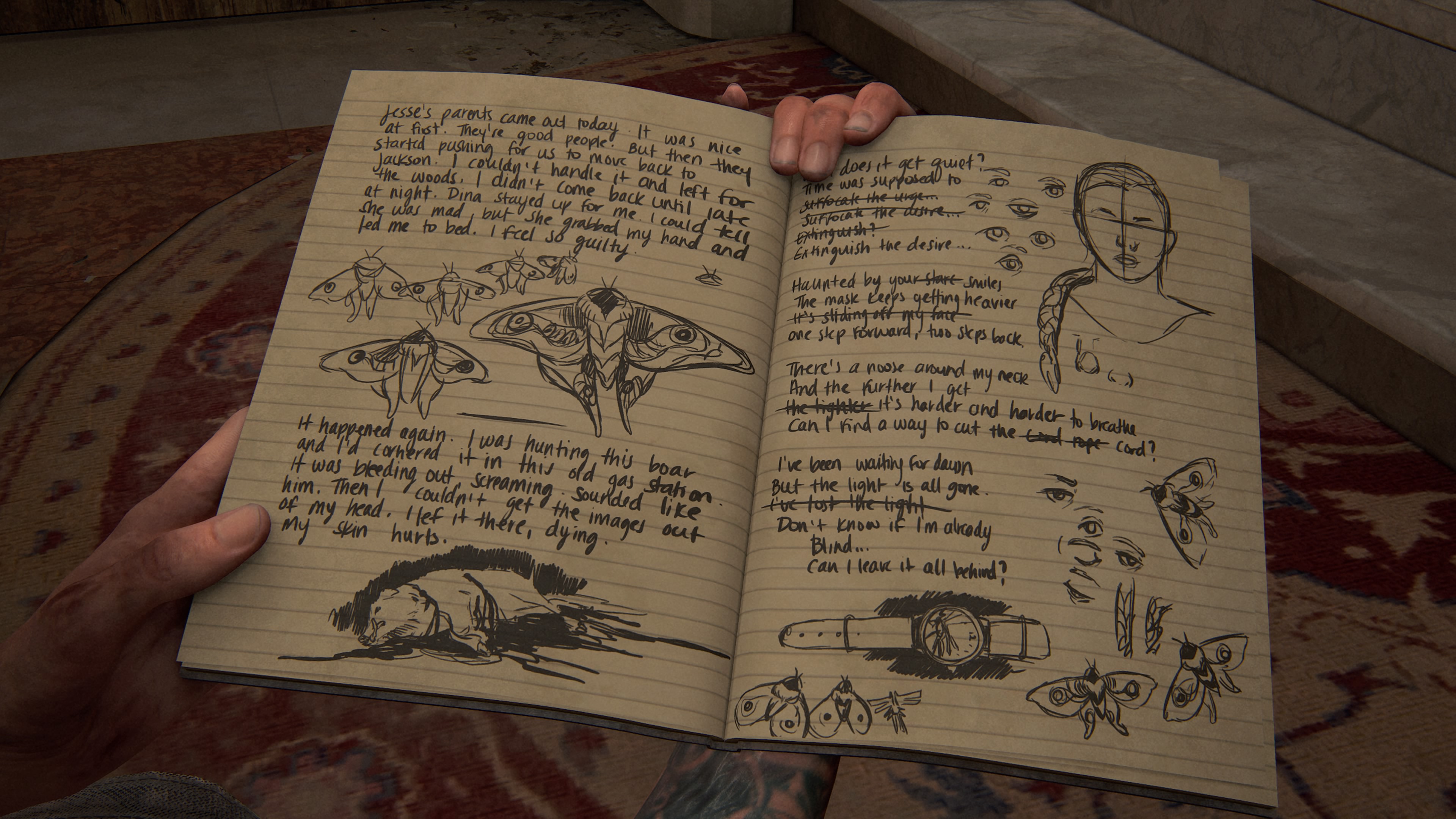
The sketches, the notes, the beauty—oh, be still my heart. One of my behaviors I want to change is this idea of being “perfect.” I made progress on this front last year, but I’m not quite where I want to be because I still feel hesitation when I even think about picking up my pencil to sketch in my notebook. But look at Ellie’s pages again. Look at her draw guidelines to draw her faces, her multiple attempts to draw eyes, her attempts to understand how a horse looks in various angles—this is what I do when I journal. I explore, I analyze, I cross out and try again.
In short, I sketch, but in words… so why not sketch in pictures, too? (lol)
Or look at Nathan Drake’s journal from another Naughty Dog game, Uncharted:
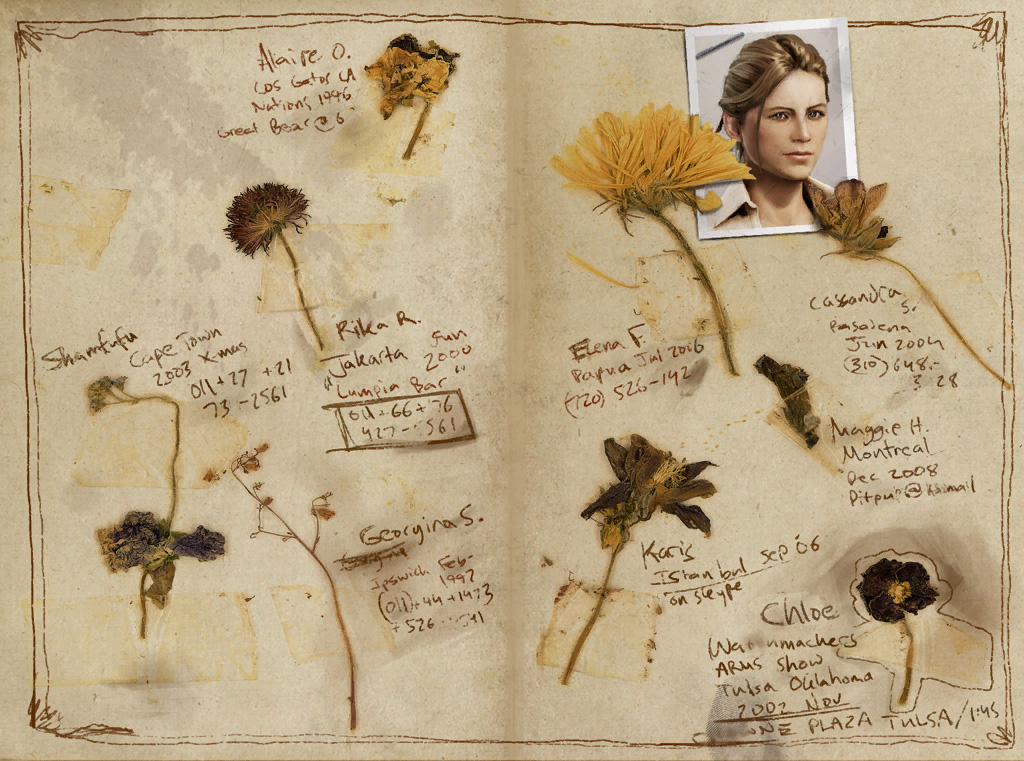
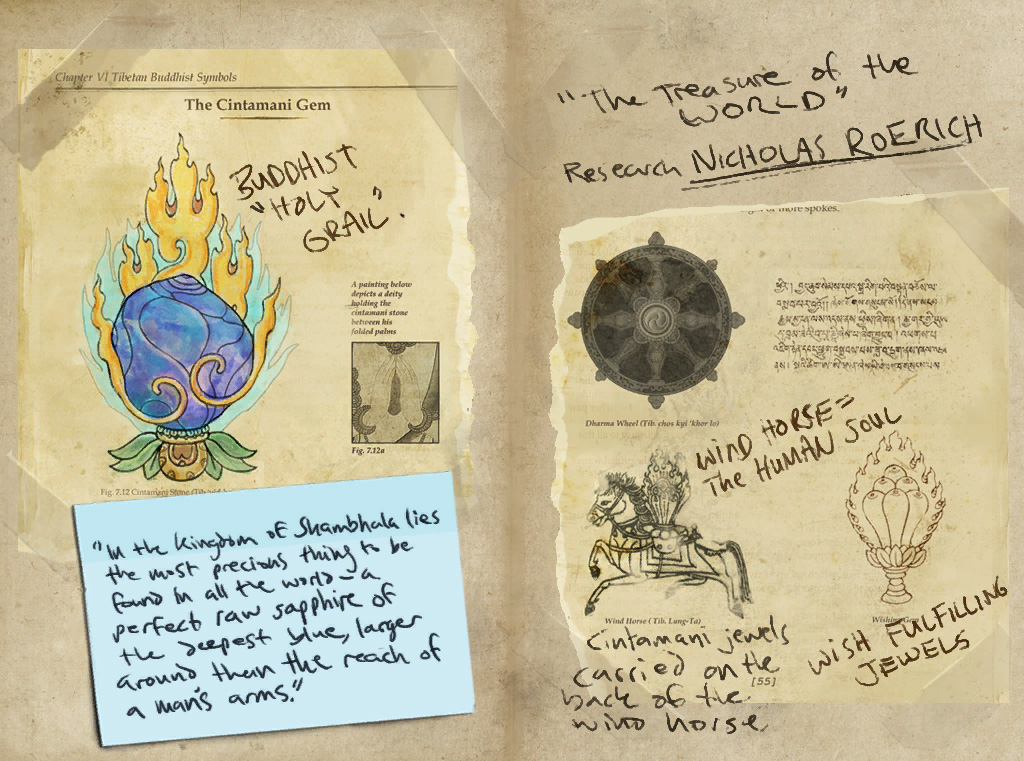
Look how messy they are: plants are taped to the pages and dying, a photo is stapled to the page, pages from books are cut out, taped, and written over. They’re so messy… and yet, I find these spreads so beautiful. There’s a soul to them I feel my notebooks are missing. My notebooks are filled with pages and pages of my bad handwriting, bad handwriting that has helped me in so many ways, sure, but… I want more.
I want to sketch; I want to figure out how to draw the same face from multiple angles; I want to sketch buildings and landscapes and animals and whatever else; I want to mess up and cross things out and be okay with that; I want to tape scraps of whatever onto the page and be okay with that, too.
In short, I want to do more than just write in my notebooks. I want to be more like Leonardo or Ellie or Nathan or that little shit in 5th grade who first learned about Leonardo da Vinci and wanted to be just like him. I want to be messy and curious and happy to simply be alive, and I want to express all of that in my notebooks, these little books of joy.
That’s what I want to do this year. That’s what I want to attempt to do this year, this year I’m calling the “Year of the Sketchbook.”
I hope I can make that little shit proud…
Om Malik, in a post titled Why internet silos win, writes:
It doesn’t matter whether it is Twitter, Instagram, or Mastodon. Everyone is playing to an audience. The social Internet is a performance theater praying at the altar of attention. Journalists need attention to be relevant, and experts need to signal their expertise. And others want to be influencers. For now, Twitter, Instagram, and their ilk give the biggest bang for the blast. It is why those vocal and active about Mastodon are still posting away on Musk’s Twitter.
If we didn’t care for attention, we wouldn’t be doing anything at all. We wouldn’t broadcast. Instead, we would socialize privately in communication with friends and peers.
I’m using Om’s post as a jumping off point for something I’ve been holding onto and thinking about for a while. I’ve written my thoughts on social media before, and I see these current thoughts as an evolution on what I’ve written before. Mostly: I’m not an online community kind of guy, and I need to finally accept that.
When I jumped on the Mastodon bandwagon a few months ago, I wrote that I had mostly been enjoying myself. And that was true, I guess, but that feeling didn’t last very long. It wasn’t really who I followed, it was the whole idea of a timeline, or the feed. The feed, this box filled with 280 characters or 512 characters or an unlimited number of characters; this box filled with cat photos or moss photos or pretty sunsets; this box filled with people trying to sell me stuff, to influence my behavior in some way, to convince me that their views are right and their views are wrong; this box can go to hell.
I don’t need it, I don’t want it, and I need to get away from it.
Last month, Robin Sloan had this to say about Mastodon, words that have stuck with me ever since (I’m quoting all of it):
Don’t settle for Mastodon
I suppose this is an anti-avenue, because: Mastodon is not it.
When you tell me about Twitter vs. Mastodon, I hear that you got rid of the flesh-eating piranhas and replaced them with federated flesh-eating piranhas. No thanks, I’m still not swimming in that pool!
I’m not saying you shouldn’t create a Mastodon account, or that you can’t enjoy fun, percolating conversations on that platform. I’m just saying that it does not, to me, represent a sufficiently interesting experiment, because it accepts too much as settled.
The timeline isn’t settled.
The @-mention isn’t settled.
Nothing is settled. It’s 2003 again!
Nothing is settled. But what I don’t want to happen is probably what Robin wants to happen, and that’s for people to create something new to replace what’s already here. A new social network paradigm or something similar. What I’m thinking is: no, no we don’t. I don’t think all of humanity was meant to connect to each other in this way, something M.G. Siegler wrote (and I quoted and wrote about) back in October of 2021; mainly, that the problem is us, human beings.
A few weeks ago I went to my friend’s house and we played Uno, Old Maid, and Go Fish with her son and husband, and I had a blast—we all had a blast. We joked around and told stories and I lost my “crown” to my friend because he won the last game of Old Maid, and it was genuinely and simply a lot of fun. What I’m arguing for myself is that I want and need my “tribe,” my smaller community of good friends and family that I can see and hear regularly, and not these formless, shapeless outlines of people behind a screen. I know social networks provide something different—especially for marginalized communities—but this is what I prefer, a real life community.
Aren’t you being hypocritical? I hear someone asking. You have a blog, you’re still on Facebook and Instagram, you’re a Bookshop.org affiliate and are trying to sell me something, so why should I listen to you? You’re right and you shouldn’t. Nobody should listen to me. Like I said, my thoughts on all this are still evolving and will continue to evolve. But I am still going to try and figure out what’s best for me. On the last day of 2022, for example, I collected my login information for my Mastodon, Micro.blog, and other accounts, I saved them in a CSV file (two-factor codes and everything), I deleted my login information from my password manager, I deleted all my cookies and history from all my devices, and I tucked away that CSV file deep in my Documents folder. I am still thinking about maybe printing this information instead, but for now, this is what I’ve done. My intention is to never again login to these services, to never again contribute content to these services, and to simply let them rot until the end of time.
I guess what I’m yearning for is a more genuine human connection with those I already know and will meet in the future, and a way to pull away from these boxes the Internet or tech companies or modern culture as a whole wants to put me in. And to do that, I need to reclaim my attention, to focus on my hands and what I can build with them, and less on those things sucking away at my eyeballs and stimulating my reptile brain.
But what about your blog? Aren’t you writing for an audience or for the chance to build one? Yes and no, I guess. Again—I don’t know. I have an unending physical need to write. I have had it for decades now, and writing online forces me to write something different than when I write fiction or when I journal in my notebook. I don’t think I would have ever written any of these thoughts if I didn’t have my website. They would have been short notes here and there in my notebooks, and maybe a throwaway line a character says in one of my novels. And besides, I’m guessing most nobody reads my blog anyway? So like who cares? But yeah—I don’t know.
I’m still trying to figure my shit out. I have a long list of ideas in my drafts folder I’d still like to write and explore, and I still enjoy writing and publishing things on my own website—more for myself than for others, honestly—so I don’t know what the hell I’m doing. And that’s a good encapsulation of what being a human is like, I guess, and that’s what I want to be doing more of, being more human.
Last week, Ted Gioia wrote a good article about Barnes & Noble’s recent turnaround, and in it, he quotes James Daunt, the current CEO of Barnes & Noble:
Back when he was 26, Daunt had started out running a single bookstore in London—and it was a beautiful store. He had to borrow the money to do it, but he wanted a store that was a showplace for books. And he succeeded despite breaking all the rules.
For a start, he refused to discount his books, despite intense price competition in the market. If you asked him why, he had a simple answer: “I don’t think books are overpriced.”
I don’t think books are overpriced. Books, to me, have always been the one exception I’ve made when it came to my budget and how I spent money. If I really wanted a book but I really didn’t have the money, I bought it anyway. I understand how irresponsible this sounds, and it is… or was. I’m fortunate to be in a position where I can afford to do this now without amassing any form of consumer debt, and in fact, the one reason why I’m not buying books all the time is because I live in a small apartment and I don’t have the space to keep them all. So I have to be a bit judicious about it (says the guy who bought more books yesterday).
I don’t think books are overpriced. And they’re not. Most paperbacks cost somewhere around $10-15, and hardcovers are maybe $10 more than that. For what books offer, that’s relatively cheap. I like buying paper books because I like writing in them (see here), and I like holding them. I’m not opposed to eBooks—hell, at the end of 2020, I wrote about Standard eBooks, and just yesterday they released about half a dozen new books, some of which just entered the public domain, and I downloaded many of them. Elmer Gantry by Sinclair Lewis sounds AMAZING. I simply prefer holding my books and writing in them. There’s a simple pleasure whenever I start a book for the first time and I bend the front cover behind the back of the book and I hold it in place as I read the page on the right, then as I get deeper into the book, I do the same but with the back cover—ahhh, I love doing that. Anyways.
I don’t think books are overpriced. Even though I only read 10 books last year, I spent $1,273.84 on books anyway. That’s a helluva lot more than I spent on music, I can tell you that much. I spent most of that money on Bookshop.org, and yeah, they charge more for books than a place like Amazon, but again, I don’t think books are overpriced. I’m happy Barnes & Noble is doing well. Whenever I make my way to Missoula, I usually try to stop at the local Barnes & Noble (after first checking out Shakespeare & Co., the best bookstore around), and I usually come away with something good (they had Spanish versions of Don Quixote and One Hundred Years of Solitude last time I was there, so I bought those).
I love books, and I love spending money on things I love… so yeah, that’s how I spent $1,273.84 on books last year. Fuck’s sake, that’s crazy, lol.
I love music (who doesn’t?), and in America, you show how much you love something by how much you paid for it, so how much did I spend on music this year?!
I spent $937.22 on music this year. Is that a lot? I feel like that’s a lot. That’s an average of $78.10 a month, which, yeah, feels about right. That’s also about 93 to 94 albums in a year, or about 7 to 8 new albums a month, which, yeah, also sounds about right. I think one of the main questions some people will have is: why not subscribe to Spotify or Apple Music or another streaming music service? And my answer to that is:
Fuuuuuuuuuuuck streaming music services. Fuck them all to hell.
I used to subscribe to Apple Music. For a few years, actually. I paid for their $99 annual plan, which came out to $8.25 a month. For $8.25 a month, I could listen to all the music I wanted. It was great! I listened to everything, and I discovered many great new artists. All in all, I had a great time with Apple Music… until I canceled it during one fire season. I had plans to renew it later, but I wouldn’t need it during fire season because I would be in the mountains where service was spotty and where I wouldn’t really have the time or the energy to listen to music anyway. And when I canceled it, I saw the last few years’ worth of music—music I’ve spent time listening to and curating and rating—vanish. Of course it vanished, but I still felt like a big part of me just died. All my new artists, all my playlists, all the work I did to curate my library to my tastes—all gone. So what did I actually pay for? All those hundreds of dollars?
For limited access to an infinite number of songs. I was renting this music—it wasn’t mine. And right then it hit me:
Fuuuuuuuuuuuck streaming music services. Fuck them all to hell.
The only music left in my music app was all the music I purchased before I subscribed to Apple Music, before I spent hundreds of dollars on… honestly? Nothing. It’s like spending $20 for a movie ticket—the cost is in the experience, and for $99 a year, I was allowed access to this musical experience for a limited time, and if I wanted continued access to it, I would have to spend more and more of my money. I would have rather spent that money on buying my music—for sure, far fewer albums than before, but at least I would own them.
And so, that’s why I’ve spent $937.22 on music this year, and why I will continue to spend more than $99 a year on music, more than $8.25 or $9.99 a month on music. Besides, the artists making this music deserve to get paid, and they get paid more when I buy their music directly rather than if I streamed it.
Do I recommend you buy your music, too? I don’t care. If you want, I guess. If you’re happy renting your music from these big companies, then more power to you. For me, though, I’m just fine spending almost $1,000 a year on music, and I will continue doing so for as long as I have money to spend.
Today was supposed to be the last day of school before the holiday break, but:
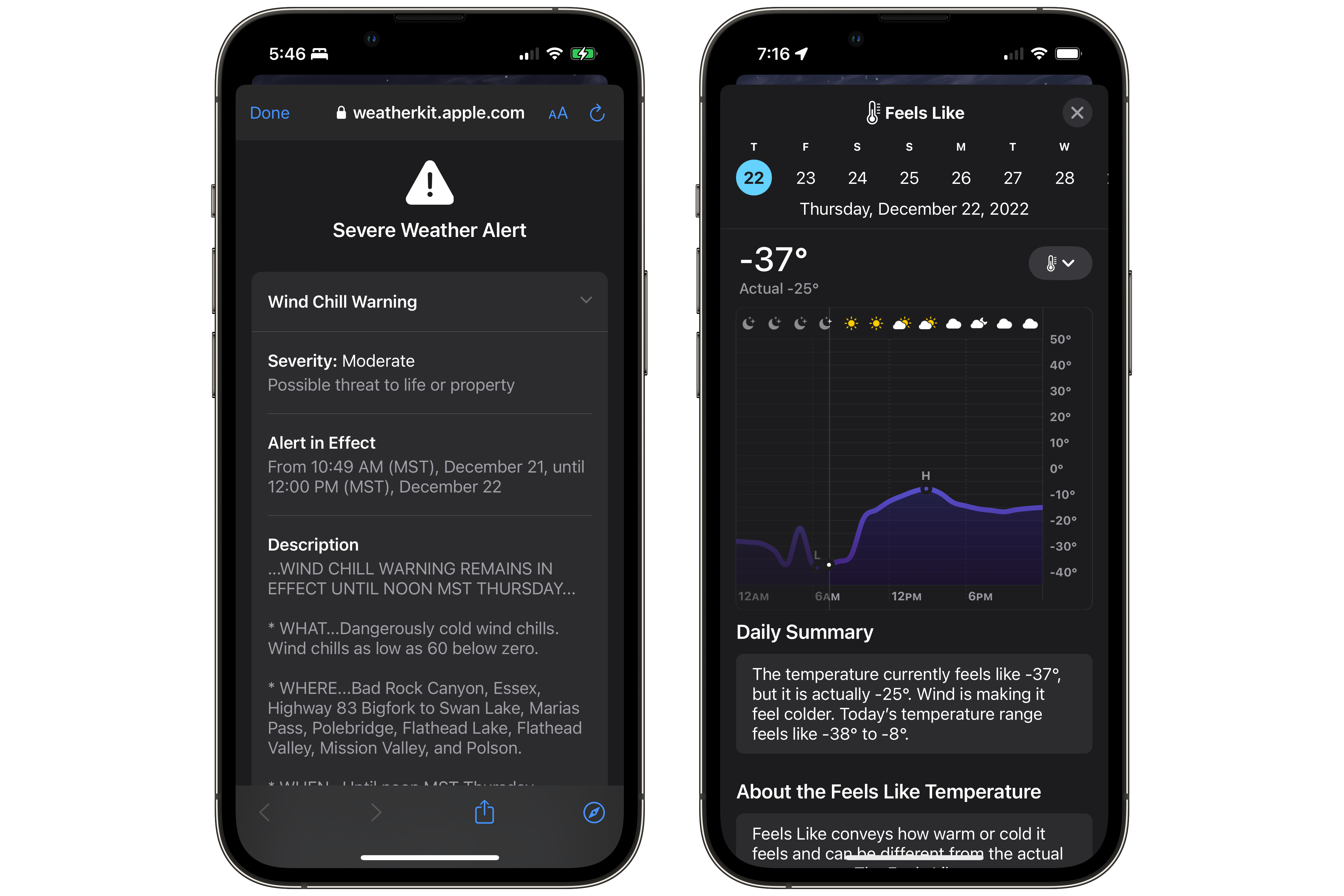
School was canceled yesterday and today because of this really really cold winter storm affecting “a broad swath of the country.”
When the high for today is -8°F and the National Weather Service is warning us that there’s a “possible threat to life or property,” you better believe I’m staying inside, blasting my heater, and snuggling underneath a warm blanket.
These old bones miss sunny San Diego. Be safe everyone!
Page 1 of 7